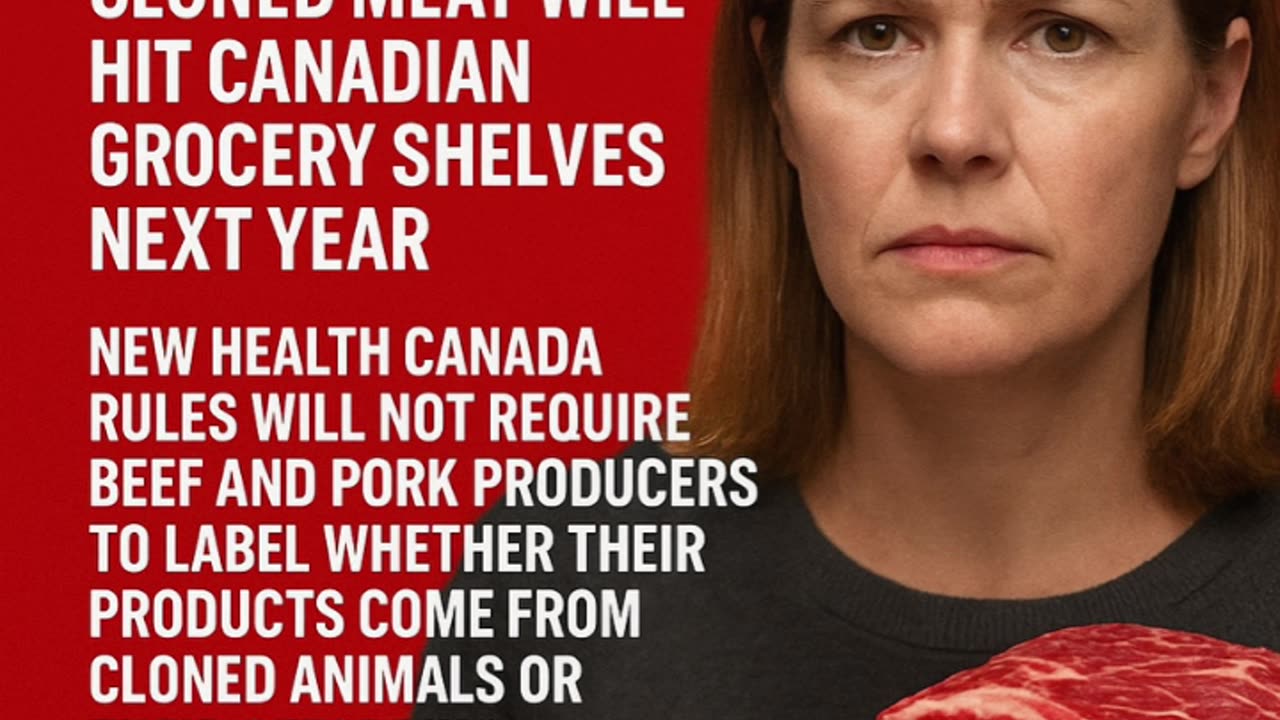Premium Only Content

Cloned Meat Is Coming to Canada — And They’re Hiding It From You
CLONED MEAT IN CANADA
Would you want to know if your steak came from a cloned animal?
Because under Health Canada’s new regulatory changes, you won’t have that choice.
Canada is moving ahead with a policy that allows meat from cloned cattle and swine, as well as the offspring of cloned animals, to enter the food supply without mandatory labeling. This means beef and pork from cloned bloodlines will appear in grocery stores with no warnings, no identifiers, and no way for Canadians to know what they are actually eating.
This decision comes after a quiet consultation process that most Canadians never even knew about. The public consultation closed in May of 2024, and by November 2025 the government signaled that the policy would move forward, removing cloned meat from the “novel food” category. Once it is no longer considered a novel food, it no longer requires special review, special oversight, or any kind of label. It simply becomes regular meat under Canadian law.
Health Canada claims that meat from cloned animals is indistinguishable from conventional meat and therefore does not need to be labeled. But this is not a debate about safety. This is a debate about transparency, honesty, ethics, and the public’s right to know. If the government truly believed Canadians would embrace cloned meat, they would label it openly. The fact that they refuse to label it speaks volumes.
Cloned animals are created through assisted reproductive technologies. The cloning process has one of the highest failure rates in modern agriculture. Many embryos never survive. Many animals that do survive are born with abnormalities, painful health conditions, and shortened lifespans. This is not rare. It is a well-documented pattern. Scientists have warned for years that cloning creates significant animal welfare concerns, but those concerns have been swept aside to push this policy forward.
And while cloned animals themselves are expensive and not usually used for meat, it is their offspring — the genetically identical, mass-produced next generation — that ends up in the food supply. Canada is now allowing this without telling consumers.
There are also serious concerns about genetic diversity. Cloning produces animals with identical DNA. When you create large herds of genetically identical livestock, you remove the natural variation that protects a food system from disease outbreaks. One single weakness, one new virus, or one environmental stress can wipe out an entire cloned bloodline. Critics warn that this policy increases the vulnerability of Canada’s entire livestock sector.
Another major issue is trust. Canadians were not properly informed. There was no broad national conversation. No open debate. No front-page headlines. This policy is being implemented quietly, and that alone should raise red flags. When a government believes people will approve of a decision, they celebrate it. When they believe people will oppose it, they try to slip it in unnoticed.
Industry supporters argue that mandatory labels would cause unnecessary fear. But the truth is simple: removing labels removes choice. If cloned meat is safe and ethical, why hide it? Why not let Canadians decide for themselves?
Some responsible producers, like duBreton, one of the largest pork companies in Canada, have publicly stated they do not use cloning practices. They have even encouraged voluntary labeling so consumers can choose clone-free products. But voluntary labels create an unfair system. Companies that choose transparency must take on extra costs and paperwork, while companies using cloned animals can remain silent. This benefits corporations, not consumers.
There are also major international implications. Many countries, especially in Europe, have far stricter rules on cloned livestock. By allowing unlabelled cloned meat into the Canadian food system, Canada risks creating export barriers and damaging the reputation of Canadian beef and pork abroad. Small farmers could pay the price for a decision they never agreed to.
This decision sets a dangerous precedent. If the government can quietly remove labels for cloned meat, what stops them from removing labels on genetically modified foods, lab-grown meat, synthetic substitutes, or any other controversial technology? Each step of secrecy pushes Canadians further away from informed consent.
The core of this issue is not just cloned animals. It is the erosion of transparency. It is the pattern of pushing new technologies without public awareness. It is the slow, steady removal of the consumer’s right to know.
Canadians deserve honesty. Canadians deserve the truth. Canadians deserve the ability to choose what they feed their families.
Cloned meat without labels is not transparency. It is not accountability. It is not respect.
It is secrecy. And Canadians should reject it.
-
 2:19
2:19
Canadian Citizens Journal
2 days agoTHE TRUTH THEY TRIED TO BURY: What Really Happened at the Universal Ostrich Farm
57 -
 LIVE
LIVE
Wendy Bell Radio
4 hours agoIt's All Connected.
4,366 watching -
 DVR
DVR
Chad Prather
11 hours agoThe Habits That Make Believers Unstoppable
26.7K38 -
 LIVE
LIVE
LFA TV
11 hours agoLIVE & BREAKING NEWS! | TUESDAY 11/18/25
4,979 watching -
 LIVE
LIVE
Game On!
20 hours ago $2.79 earnedCollege Football Week 13 Playoff Predictions And BEST BETS!
376 watching -
 37:29
37:29
Link to the Light
13 hours ago $4.53 earnedThe Greatest Month in Video Game History
32.6K2 -
 1:09:39
1:09:39
LIVE WITH CHRIS'WORLD
12 hours agoTHE WAKE UP CALL - 11/18/2025 - Episode 8
11.3K3 -
 2:05:33
2:05:33
BEK TV
1 day agoTrent Loos in the Morning - 11/18/2025
15.7K1 -
 5:58
5:58
DropItLikeItsScott
22 hours ago $2.80 earnedThe BRIGHTEST EDC Flashlight? NITECORE EDC37
11K1 -
 LIVE
LIVE
The Bubba Army
23 hours ago$2000 TARIFF WINDFALL - Bubba the Love Sponge® Show | 11/18/25
1,806 watching